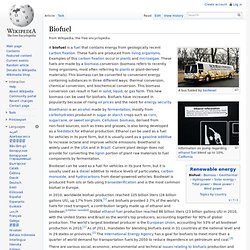

American Coalition for Ethanol : Home. Biofuel. A biofuel is a fuel that contains energy from geologically recent carbon fixation.

These fuels are produced from living organisms. Examples of this carbon fixation occur in plants and microalgae. These fuels are made by a biomass conversion (biomass refers to recently living organisms, most often referring to plants or plant-derived materials). This biomass can be converted to convenient energy containing substances in three different ways: thermal conversion, chemical conversion, and biochemical conversion. This biomass conversion can result in fuel in solid, liquid, or gas form. Bioethanol is an alcohol made by fermentation, mostly from carbohydrates produced in sugar or starch crops such as corn, sugarcane, or sweet sorghum. Biodiesel can be used as a fuel for vehicles in its pure form, but it is usually used as a diesel additive to reduce levels of particulates, carbon monoxide, and hydrocarbons from diesel-powered vehicles.
Liquid fuels for transportation[edit] Bio-generator-Final-report. Annex-IX_DD_presentation_En. E85. Logo used in the United States for E85 fuel E85 is an abbreviation for an ethanol fuel blend of 85% denatured ethanol fuel and 15% gasoline or other hydrocarbon by volume, although the exact ratio of fuel ethanol to hydrocarbon can vary considerably while still carrying the E85 label.

The ethanol content is adjusted according to the local climate to maximize engine performance. ASTM 5798 specifies the allowable fuel ethanol content in E85 as ranging from 51% to 83%.[1] E85 is commonly used by flexible-fuel vehicles (FFV) in the United States and Europe. In the United States, government subsidies of ethanol in general and E85 in particular have encouraged a growing infrastructure for the retail sale of E85, especially in corn growing states in the Midwest. [citation needed] Current factory-made E85 vehicles do not deliver as much fuel economy as vehicles utilizing conventional gasoline.
Fuel economy[edit] Excessive fuel pulse width modulation[edit] Octane and performance[edit] Emissions[edit] Ethanol fuel. Ethanol fuel is ethanol (ethyl alcohol), the same type of alcohol found in alcoholic beverages.

It is most often used as a motor fuel, mainly as a biofuel additive for gasoline. World ethanol production for transport fuel tripled between 2000 and 2007 from 17 billion to more than 52 billion liters. From 2007 to 2008, the share of ethanol in global gasoline type fuel use increased from 3.7% to 5.4%.[1] In 2011 worldwide ethanol fuel production reached 22.36 billion U.S. liquid gallons (bg) (84.6 billion liters), with the United States as the top producer with 13.9 bg (52.6 billion liters), accounting for 62.2% of global production, followed by Brazil with 5.6 bg (21.1 billion liters).[2] Ethanol fuel has a "gasoline gallon equivalency" (GGE) value of 1.5 US gallons (5.7 L), which means 1.5 gallons of ethanol produces the energy of one gallon of gasoline.[3] Bioethanol is a form of quasi-renewable energy that can be produced from agricultural feedstocks. Saab 9-3 SportCombi BioPower. GREENPOWER.